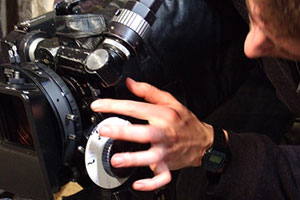Film/Television Camera Operator
Tasks & duties

Film/television camera operators:
-
study the script
-
may interpret how the scenes should look
-
select suitable cameras and equipment
-
may decide on the location of the cameras and lights
-
set up the cameras and equipment such as lighting rigs and kits
-
work with and follow the instructions of the director
-
advise on the best way to shoot or film a scene
-
operate the cameras to film or record the action
Camera operators who film current affairs and documentaries may work independently without direction from a director and operate sound and lighting equipment.
Skills & knowledge

Film/television camera operators need to have:
-
technical skills for operating film and video cameras
-
up to date knowledge of filming methods and equipment
-
knowledge of exposure, focus, colour and lighting
-
understanding of the filming process and how a tape will be edited
-
good communication and people skills, as they work closely with other members of the production crew
It is also helpful if they have an appreciation of art.
Entry requirements
There are no specific entry requirements to become a film/television camera operator. However, a tertiary qualification in television, film or video production is useful.
Secondary education
Sixth Form Certificate or NCEA equivalent English, maths, photography, physics and art are useful subjects. Some schools offer unit standards in film and television, which may also be useful.
Training on the job
Skills are gained on the job. Most film/television camera operators start off as camera assistants to gain experience on the set, and work up to operating the camera.
Useful experience
Useful experience for film/television camera operators includes using home video cameras, photography, working backstage in a theatre, working for a production company, film-making, video or television work, and computer work.
Video
From just a job on you tube
Related courses
Audio Visual Studies
Journalism, Communication and Media Studies
For more information, please refer to Career Services.
Document Actions
